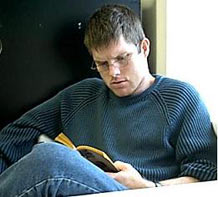 Wednesday, July 13, 2005
Wednesday, July 13, 2005
American radicals.
Why is American music history filled with such compositional oddballs like Cowell, Antheil, Ornstein and A. P. Heinrich to name a few? The United States seems to have a long tradition of eccentric composers; In the 19th century, we had Gottschalk and A. P. Heinrich and in the 20th century, we had Cowell, Ornstein, Partch, Carter, Antheil, Cage, Earle Brown, and others.
Each of these composers came along and had totally new ideas and definitions of music. Cowell wreaked havoc upon the guts of pianos, Nancarrow gave up on performers, Cage gave performers incredible freedom. It seems to me, that the musical history of various European countries does not seem to have the large number of musical oddities that we have had here.
Am I wrong about this?
What is it in America that has created and encouraged all of these unique voices in music?
Is it the American pioneer spirit, but carried over into music?
Is it something in the water?
posted by Everette Minchew
8:03 PM
|
|
 Composer Everette Minchew (born 1977) is consistently active in the creation, performance, and promotion of contemporary music. Moderately prolific, his catalogue includes small chamber pieces for violin, piano, various wind instruments, harpsichord and electronic music. Current commissions include a string trio and an opera based on an 11th-century crusades tale.
His earliest musical training came at the age of eleven when he began playing alto saxophone; it wasn’t long until he began his first attempts in composition.
Composer Everette Minchew (born 1977) is consistently active in the creation, performance, and promotion of contemporary music. Moderately prolific, his catalogue includes small chamber pieces for violin, piano, various wind instruments, harpsichord and electronic music. Current commissions include a string trio and an opera based on an 11th-century crusades tale.
His earliest musical training came at the age of eleven when he began playing alto saxophone; it wasn’t long until he began his first attempts in composition.
He received a Bachelor’s Degree in Music History from the University of Southern Mississippi, where he studied saxophone under world-renowned soloist, Lawrence Gwozdz.
Fearing that traditional university training would hinder his development as a progressive composer, he abandoned the idea of formal lessons in favor of an intense private study of modern masterworks.
Minchew's works are characterized by their intense timbral explorations and brutal dissonance. That is not to say, however, that the compositions are devoid of beauty. In the first of the Two Brief Pieces, for example, the harpsichord chimes stringent yet haunting chords evoking a sense of loss.
Other pieces, like the Figment No. 2 "Juggler's Fancy" play upon the kaleidoscopic interaction between timbres and tones. The rapid alternation of pizzicato, arco bowing, and extreme glissandi remind the listener of Xenakis coupled with a Berio Sequenza. Minchew's Invention "Two-Part Contraption" for piano owes much to Ligeti's etudes and boogie-woogie jazz.
His music has been performed around the United States, and he was the featured composer at the 2005 Intégrales New Music Festival in Hattiesburg, Mississippi.
He currently resides in Hattiesburg, Mississippi with his wife, Cheryl.
CONTACT INFORMATION
| |



